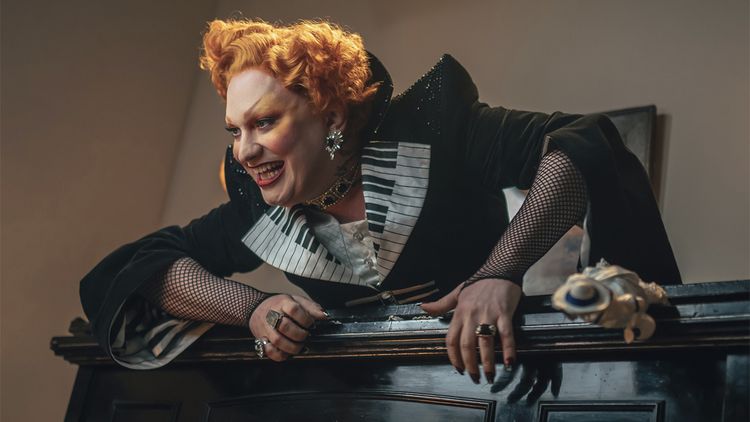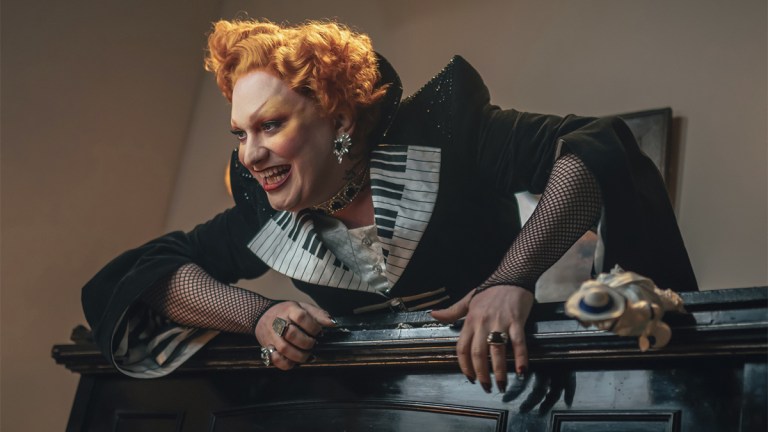Doctor Who Series 14 Episode 2 Review: The Devil's Chord

Rewritten: Written on May 10, 2024, by Stefan Mohamed: Today, I'm going to share with you my musings about a topic that has been on my mind for quite some time. I hope my thoughts resonate with you and offer a fresh perspective. As we journey through life, we encounter many challenges and hurdles that can test our resilience and fortitude. However, it's important to remember that every obstacle presents an opportunity for growth and learning. In essence, embracing adversity is essential to personal development and progress. Instead of shying away from challenges, we should face them head-on and explore the lessons that they offer. It's easy to fall into the trap of believing that life should be a smooth ride without any bumps or hurdles, but this is far from the truth. In fact, it's the challenges that make life interesting and fulfilling. So, the next time you find yourself facing a difficult situation, remember that it's an opportunity to learn and grow. Don't be afraid to embrace the challenge and emerge on the other side stronger and wiser.

Caution: This assessment of Doctor Who includes divulging key elements of the plot.
To employ certain technical musical vocabulary - this is an excellent piece.
As a fan, I was really excited when I found out that Russell T Davies would be in charge of the show again. He played a big role in bringing Doctor Who into the modern era and making it something special. After that, he made a bunch of other successful shows, so he really didn't need to come back. I figured if he was going to, it must be because he had fresh ideas, new concepts, and exciting experiments he wanted to explore.
It was quite thrilling. The Tennant specials were impressive, but they were more of a celebration of the 60th anniversary with old friends bringing closure to unfinished business. However, there were still some surprises, like the bi-generation storyline, which we might not see for a while according to this recent episode. "The Church on Ruby Road" and "Space Babies" were mostly focused on introducing the new Doctor and companion, dropping little hints of what's to come.
With "The Devil's Chord", it appears that a new age has definitely begun. The choice of the 1960s setting is excellent, not only because of the trendy clothing (even though they are undoubtedly trendy). It's recognizable enough to keep us rooted, but it's not an area that the show has explored extensively since, well, the 1960s. Furthermore, the emphasis on music and how it combines with the storytelling and imagery seems exciting and stimulating.
The blog talks about an episode that explores the idea that music is what keeps humans united. Although the show doesn't delve deeply into this theme, it's still an excellent idea that leads to some very imaginative scenes. The episode features Doctor Who villains who normally suck the life force out of people, but this time they extract music from their victims, either to consume it like food or use it like a magical power. The Doctor and his companion find themselves trapped inside musical instruments they must play to escape. They engage in a frenzied musical duel against a demented god armed with a violin, while a piano imbued with the energy of future Beatles albums adds to the excitement.
To be honest, this review could easily be a list of all the awesome details in the episode. The knocking coming from inside the piano was simple yet super creepy. The Doctor silencing the entire area was spine-chilling, and something new for the show. It was also really cool to see Maestro use a tuning fork like a sonic screwdriver. The flash-forward to 2024 was expertly done, with Millie Gibson's character's heart-wrenching cry for her mother. The use of music concepts like the titular chord and Aeolian tones added to the overall theme of superstition affecting reality. And let's not forget the fun touches like Maestro playing the theme tune and the Doctor's "I thought that was non-diegetic" line. I could keep going, but you get the idea.
In some ways, it's a huge relief because there were concerns. In February, it was announced that Sam Mendes would direct four interconnected biographical movies about the Beatles. It felt like an extremely challenging casting task. There are only a few music groups where the general public is so well-versed in each member's voice, personality, and relationships, which are just as well-received as their songs. Then came the news that Doctor Who would also be recruiting actors to play the iconic band, causing alarm bells to go off. Casting choices can either succeed or fail, and if the Beatles were going to play significant parts, a mistake could have ruined the whole project.
Luckily, they managed to succeed. George and Ringo don't have many lines, which is fitting, but Chris Mason and George Caple portray John and Paul quite well. Although they don't resemble the Mop Top icons completely, they convey sufficient character traits that maintain the illusion. They also bring a nuanced touch that heightens the impact of the more introspective, emotional scenes. Mason's voice wavering during "Why do I wake up crying" is especially powerful. Perhaps their performances couldn't have handled more prominence, but their utilization is just enough to strike a chord.
In the end, Jinkx Monsoon is actually the main attraction, instead of The Beatles.
Monsoon, who won RuPaul's Drag Race season five as an unexpected winner because of her amusing and pleasant personality, has since risen to become the "Queen of All Queens" and a Broadway star. Her recent appearance as a villain in Doctor Who has been satisfying to witness and she is, unquestionably, the standout performer in this episode.
Subscribe to our email list
Receive the top-notch content of Den of Geek directly into your email inbox!
The role of Maestro is a challenging one, with the character being both highly confident and imposing. It's essential that the performer has complete control of their approach to the role to ensure that it doesn't become overbearing. Fortunately, Monsoon strikes just the right balance, knowing when to be bold and when to show restraint. She's equally at home being funny or menacing and has a strong singing voice to match. Her sardonic, unpredictable style brings to mind Michelle Gomez's portrayal of Missy, and there are even hints that Maestro may be a new incarnation of the character at one point. However, this connection is not overdone, and Maestro is very much her own character. Linking her to the Toymaker is a smart move, adding extra depth to the story and building a sense of impending danger that goes beyond anything we've seen before.
Although some parts of the story were good, there were some things that didn't quite fit. At the beginning, the Doctor is seen running away from Maestro because in the past he had a bad experience with a similar being that split his soul in two. It makes sense for him to not want to face that again. However, in the previous episode called "Space Babies", the Doctor also ran away from a monster, but in that case, it was intentional to show that it didn't feel right to him. So, the effect of the Doctor running away in this episode wasn't as powerful as it could have been.
Possibly, it's just because I watched those two episodes consecutively. It was fascinating to witness the Doctor's anxiety drive him to be quick on his feet and adjust to facing a foe functioning on the basis of mythology and symbolism. However, when Ruby mentioned "You never hide", it made me realize that he actually does hide at times.
The mentions of past events in the episode were a mix of success and failure. It was enjoyable to see the Doctor recall Totter's Lane and Susan, his granddaughter who he left behind in a war-torn 22nd century without her consent. However, delving deeper into this storyline could potentially create more problems than solutions and cause instability in the established lore. The writer may have had a plan for the future, but incorporating this moment in the current episode felt insignificant for longtime fans and potentially bewildering for new viewers.
The ending of the episode has a surprising twist. Although there were lots of music references, as well as scenes where the actors talk directly to the audience, it still makes sense to have a big production number. The choreography is impressive and there are fun little references to classic movies, but the song itself is not great. This is similar to the Christmas special's musical number. It is not a strong point for the writer of the show, Russell T Davies. Although it wasn't as bad as "The Goblin Song," the show may have reached a limit in its ability to impress the audience.
It's alright, really. I appreciate when things take risks and try something new. Although there were some small missteps, this episode had a lot of great moments. The Doctor and Ruby supporting each other, music references to "Danse Macabre" and "Rhapsody in Blue", Maestro describing Ruby as "very wrong", delighting in killing an innocent old lady, delivering the line "Lovesick songs for heartbroken lesbians", and everything else Maestro does - it's easy to overlook any mistakes.
The musical group has completed their pre-performance preparation. It's time to begin the presentation.
By the way, I have a prediction for "The One Who Waits." My guess is that it's Rory Pond.
The TV show, Doctor Who, will be airing the episode called "Boom" the following week. You can watch it on BBC iPlayer or BBC One if you're in the UK, and on Disney+ if you're in the US or anywhere else in the world.









































